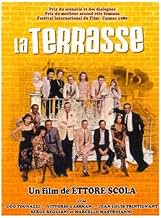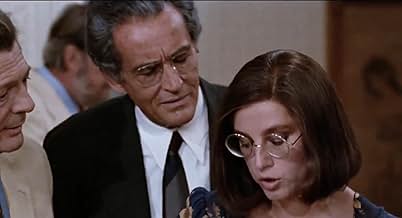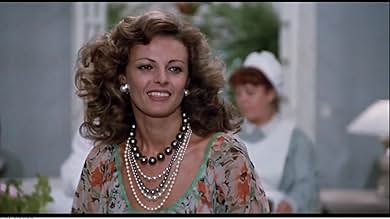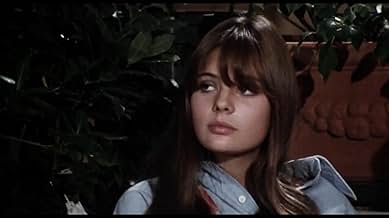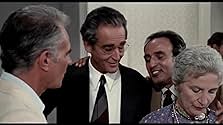AVALIAÇÃO DA IMDb
7,1/10
2 mil
SUA AVALIAÇÃO
Adicionar um enredo no seu idiomaDuring a dinner in a Roman terrace, the lives and experiences of multiple characters intertwine.During a dinner in a Roman terrace, the lives and experiences of multiple characters intertwine.During a dinner in a Roman terrace, the lives and experiences of multiple characters intertwine.
- Direção
- Roteiristas
- Artistas
- Prêmios
- 5 vitórias e 1 indicação no total
Jean-Louis Trintignant
- Enrico D'Orsi
- (as Jean Louis Trintignant)
Agenore Incrocci
- Vittorio
- (as Age)
Leonardo Benvenuti
- Un ospite
- (as Leo Benvenuti)
- Direção
- Roteiristas
- Elenco e equipe completos
- Produção, bilheteria e muito mais no IMDbPro
Avaliações em destaque
Ettore Scola seemed to epitomize Italian cinema in the 70's and early 80's. What great films he did: We All Loved Each Other so much, Ugly Dirty and Bad, A Special Day (for me it's Mastroianni's best), Passion of Love (incredible story of beauty and ugliness), Le Bal, etc. Where directors like Bertolucci and Bellochio seemed to lose their way in political argument, Scola stayed on his feet and created wonderful satires of bourgeois complacency.
The Terrace is too long--almost three hours--and too loaded with characters to have much force. The political and social problems described here seem obscure and distant from us in time. The speech Mario gives to the PCI congress is well done (he's asking for forgiveness for his adultery with Giovanna) but hasn't much dramatic effect. Much better are the little touches: the elderly waiter dragging the wagon over the tile floor, making an awful screeching sound as Luigi and Carla dine; the workmen who reduce the size of Sergio's office in ten seconds flat--wonderful effect; Sergio trying to talk to the head of RAI in the latter's office, with the huge Grecian bust between them, very funny.
I should point out that far too much of the comedy misses its mark and falls flat: I don't know what Scola was trying to do with Enrico's writer's block and the finger in the pencil sharpener. Marie Trintignant appears as eye candy throughout the film and serves no purpose in the story. If you choose to watch this, get ready to hit the fast forward button.
The Terrace is too long--almost three hours--and too loaded with characters to have much force. The political and social problems described here seem obscure and distant from us in time. The speech Mario gives to the PCI congress is well done (he's asking for forgiveness for his adultery with Giovanna) but hasn't much dramatic effect. Much better are the little touches: the elderly waiter dragging the wagon over the tile floor, making an awful screeching sound as Luigi and Carla dine; the workmen who reduce the size of Sergio's office in ten seconds flat--wonderful effect; Sergio trying to talk to the head of RAI in the latter's office, with the huge Grecian bust between them, very funny.
I should point out that far too much of the comedy misses its mark and falls flat: I don't know what Scola was trying to do with Enrico's writer's block and the finger in the pencil sharpener. Marie Trintignant appears as eye candy throughout the film and serves no purpose in the story. If you choose to watch this, get ready to hit the fast forward button.
Horrible sound, horrible photography, horrible screenplay, horrible acting. It seems to be directed with the left foot. Miles and miles away from the masterpieces 'C'eravamo tanto amati' or 'Una giornata particolare'.
Too much ambitious as well as superficial. It tries to represent the moral and political defeat of a generation, but the characters are two-dimensional.
Very uncertain in the choice of style: naturalistic or grotesque? It would have been better to go with the grotesque, because this kind of naturalism is very depressing. Scola used a bunch of actors who have always played anti-naturalistic characters in the glorious years of Italian cinema, so they are poorly utilized.
I'm sure this film will be forgotten over time.
Too much ambitious as well as superficial. It tries to represent the moral and political defeat of a generation, but the characters are two-dimensional.
Very uncertain in the choice of style: naturalistic or grotesque? It would have been better to go with the grotesque, because this kind of naturalism is very depressing. Scola used a bunch of actors who have always played anti-naturalistic characters in the glorious years of Italian cinema, so they are poorly utilized.
I'm sure this film will be forgotten over time.
10beto-19
Adorable, intelligent and politic driven movie. The best Italian director ever commands great actors and conducts the audience through a journey of passionate and bitter fellows who dare to fight for their beliefs.
In La Terrazza there are some amazing speeches - which I don't recall exactly - about every human being's right to happiness and love.
Maybe I liked it so much because I'm already a big fan of Ettore Scola. I also recommend his masterpieces "C'eravamo Tanto Amati" (the best Victorio Gassman performance) and "La Cena" (the last Gassman appearance).
In La Terrazza there are some amazing speeches - which I don't recall exactly - about every human being's right to happiness and love.
Maybe I liked it so much because I'm already a big fan of Ettore Scola. I also recommend his masterpieces "C'eravamo Tanto Amati" (the best Victorio Gassman performance) and "La Cena" (the last Gassman appearance).
The movie's status as a cult classic definitely makes sense to me now. It's a very satirical and thorough look at the italian elite of intellectuals and artists, all of them very narcissistic, pretentious, self-pitying, emotionally unstable, in a constant internal state of decay, brandishing political theory without actually applying it, fighting unsuccessfully against the world of the 80s and capitalism and profit. All the main characters are tragic, and their awareness of their own pathetic nature makes them even more unhappy. They're all men who use women or demand their attention and their love, they try to find happiness where it doesn't belong. The theme of the movie is the humorous existential loneliness of the self-aware bourgeoisie. I have some complaints, like the fact that the movie is a bit long for my taste, and some of the 5 episodes really drag. The actors are almost all pretty good, the final raging monologue of Mario is amazing. The humor holds up pretty well, and it's always interesting to see how an older generation of creatives saw themselves. Overall, not very digestible, but fine as an intellectual and thought provoking portrait of the 80s artlife.
We follow five friends at the same party. A writer, a producer, a director, a politician and a journalist. There they meet new and old flames and quarrel a bit. All are experiencing an intellectual and emotional crisis.
I loved the many subtle symbols in this film. For instance, the young girlfriends; Sergio who is not eating; the crisis of being a leftist ('I'm much more left-wing than you!'); the success of women.
Even better is Scola's mockery with intellectualism. As you sometimes hear at parties people say: 'Mannerism is out of fashion', and you haven't got an clue what the purpose is of this comment. Every character here thinks himself as being witty, except the producer, and it is precisely him who produces a dramatic masterpiece that is praised by the intellectual elite.
Scola portrays disappointments beautifully - it is seen between the lines, as it was as well in Brutti, sporchi e cattivi. So, I highly appreciated this film, but you have to bear in mind it is a film of almost three hours. A perfect film for a rainy Sunday.
I loved the many subtle symbols in this film. For instance, the young girlfriends; Sergio who is not eating; the crisis of being a leftist ('I'm much more left-wing than you!'); the success of women.
Even better is Scola's mockery with intellectualism. As you sometimes hear at parties people say: 'Mannerism is out of fashion', and you haven't got an clue what the purpose is of this comment. Every character here thinks himself as being witty, except the producer, and it is precisely him who produces a dramatic masterpiece that is praised by the intellectual elite.
Scola portrays disappointments beautifully - it is seen between the lines, as it was as well in Brutti, sporchi e cattivi. So, I highly appreciated this film, but you have to bear in mind it is a film of almost three hours. A perfect film for a rainy Sunday.
Você sabia?
- CuriosidadesSerge Reggiani's character in the movie Is producing a TV adaptation of Théopile Gautier's famous novel "The Captain Fracasse";10 years later, director Ettore Scola will make a movie adaptation of the same novel, titled "CAPTAIN FRACASSA'S JOURNEY"
- Citações
[repeated line]
Hostess at 15° PCI's Congress: Dinner is served. Come!
- ConexõesFeatured in La strana coppia. Incontro con Age e Scarpelli (2001)
- Trilhas sonorasConcerto N.8 in La Minore
by Antonio Vivaldi
Principais escolhas
Faça login para avaliar e ver a lista de recomendações personalizadas
- How long is La terrazza?Fornecido pela Alexa
Detalhes
- Data de lançamento
- Países de origem
- Idioma
- Também conhecido como
- Die Terrasse
- Locações de filme
- Foro Piscario, Via della Tribuna di Campitelli, Roma, Lazio, Itália(Mario and Giovanna in the ruins of a Roman monument)
- Empresas de produção
- Consulte mais créditos da empresa na IMDbPro
- Tempo de duração2 horas 30 minutos
- Mixagem de som
- Proporção
- 1.85 : 1
Contribua para esta página
Sugerir uma alteração ou adicionar conteúdo ausente


